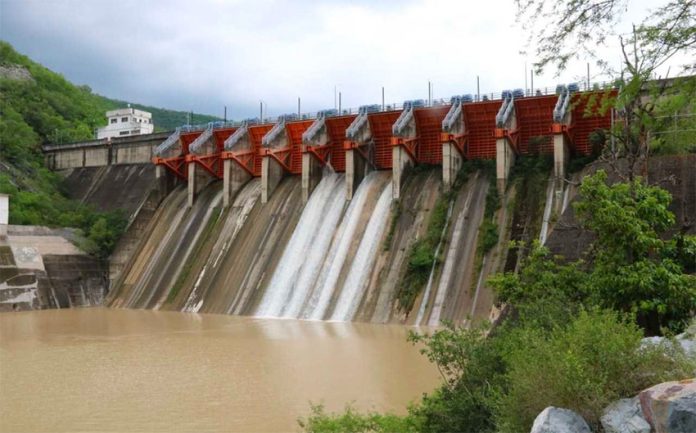More than 3,000 farmers and residents of four Chihuahua municipalities clashed with the National Guard on Tuesday over the federal government’s plan to divert water from a dam in the northern border state to the Rio Grande for the use of the United States.
The newspaper Milenio reported that protesters from Camargo, La Cruz, Delicias and San Francisco de Conchos confronted the guardsmen with the aim of removing them from the La Boquilla Dam, located on the Conchos River about 200 kilometers south of Chihuahua city.
The National Water Commission (Conagua) intends to open the sluices of the dam to divert hundreds of millions of cubic meters of water to the Rio Grande in order to comply with the 1944 bilateral water treaty between Mexico and the United States.
Mexico has a 220-million-cubic-meter “water debt” to its northern neighbor, Milenio reported. Chihuahua farmers say that the massive diversion planned by Conagua will leave them with insufficient water.
The National Guard and the army were deployed to La Boquilla last month after protesters broke into the dam on January 10.
Conagua said in a statement that it requested the intervention of the federal security forces to safeguard its operations. The incorrect use of the sluices and other dam equipment could pose a risk to the safety of residents, the water commission said.
The National Guard, however, wasn’t able to contain a large group of disgruntled farmers and residents who managed to break through their defenses during Tuesday’s confrontation.
The newspaper La Jornada reported that approximately 500 farmers entered the fenced-off dam precinct and pledged to remain at La Boquilla until Conagua guarantees that no water will be diverted from the dam.
However, on Wednesday morning guardsmen took back the dam without incident.
San Francisco de Conchos Mayor Jaime Ramírez, one of several municipal and state politicians who supported the protest, claimed that Conagua has plans to divert one billion cubic meters of water from Chihuahua, which he said would have a devastating impact on the state.
Tuesday’s protest, confrontation and occupation of the dam came after a farmers’ association in Camargo called for La Boquilla to be seized from authorities in order to prevent the “robbery of farmers’ assets.”

Also on Tuesday, farmers from Delicias blocked railway tracks and lanes running in both directions on federal highway 45 near the community of Cárdenas. They continued to maintain the blockade on Wednesday but passenger vehicles and buses were being allowed to pass. Only transport trucks were being detained.
The plan to divert water from La Boquilla “affects all of us,” Samuel García, one of the protesting farmers, told La Jornada.
“. . .the dam can’t be diverted. It’s [only] at 65% of capacity and [water for] this year’s agricultural cycle is not guaranteed,” he said.
Luis Aguilar, a National Action Party (PAN) lawmaker in Chihuahua, declared that the federal government is “committing an abuse” against the state and warned that the National Guard could remove the protesters and open the sluices of the dam “by force.”
“. . . during the campaign, we heard the now-President López Obrador saying that the poor come first but he wants to take a billion cubic meters [of water] from the La Boquilla dam to give it to businessmen in Tamaulipas and Nuevo León,” he said, claiming that it won’t just be agriculturalists in the southern United States who will benefit from the planed water diversion.
The president’s “discourse has changed,” Aguilar said. “Now the rich come first.”
For his part, Chihuahua Governor Javier Corral Jurado said that his government will do all it can to stop the diversion of water from La Boquilla and other dams in the state.
“I have to be very clear and very blunt: we’re going to support the farmers of Chihuahua, we’re going to fight for [their] rights. . . and on that, the president has agreed with me,” he said.
The PAN governor said that he expressed his concern to López Obrador about Conagua’s “unilateral” decision to divert water from Chihuahua dams to settle the water debt with the United States.
“I asked him to review the decision because the same objective can be achieved without opening the dams,” Corral said.
Source: Milenio (sp), La Jornada (sp)
